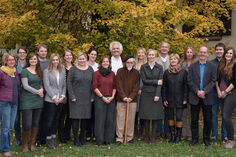Postpartum anxiety disorders as a predictor of child temperament, behavioral problems and cognitive development at pre-school age.
A follow-up study of the previous research project “Anxiety disorders in the postpartum period: Cognitive development, interaction behaviour and child neurophysiology“
Funded by the German Research Society (DFG) (2011-2014)
Coordinator:
Prof. Dr. phil. Dipl.-Psych. Corinna Reck, Ludwig-Maximilians-University Munich, Heidelberg University Hospital
Cooperation:
- Prof. Dr. phil. Sabina Pauen, Department of Psychology, University of Heidelberg
- Prof. Dr. med. Eva Möhler, Heidelberg University Hospital, Child and Adolescent Psychiatry
- Prof. Dr. med. Dr. phil. Thomas Fuchs, Heidelberg University Hospital
Correspondence:
Ms. Alexandra Tietz
Phone: +49 6221/ 56 4420
Objective and background:
The impact of postpartum anxiety disorder on mother-infant interaction and child behavior has hardly been subject of investigation. This study aims to clarify whether postpartum anxiety disorders have an effect on pre-school children’s development. Participants of the previous longitudinal study about postpartum anxiety disorders are recruited at a child’s age of five years. Main goal is to examine if postpartum anxiety disorders and mother-infant interaction are linked to child behavioral outcomes and child development at pre-school age. Of special interest is thereby if children of severely postpartum anxious mothers are more prone to behavioral inhibition than children of mothers with no psychopathology. Behavioral inhibition is defined as the tendency to express fearfulness or restraint when being exposed to unfamiliar stimuli such as people, objects or situations (Kagan, Reznick, Sndiman, Gibbons, Johnson, 1998). Child development, psychopathology and stress reactivity are also of interest.
Procedure:
The sample previously recruited from 2006 to 2010 is comprised of control mothers with no former or previous psychopathology and mothers with anxiety disorders three months postpartum. The diagnosis is given according to the Structured Clinical Interview for DSM Disorders (SCID-I). Mother and child are re-recruited at a child’s age of five years. Besides, behavioral inhibition, the children’s cognitive and executive functioning are assessed. Moreover, the mother-child interaction is examined by a video based free-play. In addition, saliva samples taken before and after the experimental paradigm of behavioral inhibition are used to measure children’s stress reactivity (cortisol). If the quality of mother-infant interaction may indeed moderate the relationship between maternal postpartum anxiety disorders and a child’s emotional, social and cognitive development, the results of the study contribute to the implementation of early intervention and prevention methods.



